Keeping the Promise
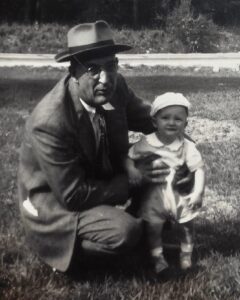
In these troubled times, memory reels of my mother’s father keep rolling through my mind. He lived through the 1918 influenza pandemic in Keokee, Virginia, a coal-mining town where kids call their grandfather Papaw.
When I was little, Papaw and Nanny lived near our house on route 60 just west of Yorktown. One of my earliest memories is dancing with him in their living room to songs like Buttons and Bows and Swinging on a Star played on a crank-up Victrola. He picked me up and waltzed me around the room with soft laughter that came from deep in his chest.
When I turned surly and lazy in my teen years, he tried to lift me out of my funk with heartfelt talks, but I wouldn’t listen to him. I wouldn’t listen to anyone.
After we moved away to White Hall and I outgrew my sour attitude, Papaw and Nanny came to visit us. I worked on the Maupin farm that summer. On a hot as hell day we baled hay in a field beside the parsonage. When I came home at quitting time, Papaw met me at the door. “I saw you out there, boy,” he said, smiling. “For a long time I thought you wouldn’t amount to anything, but it looks like I was wrong.” That moment meant a lot to me then. It still does.
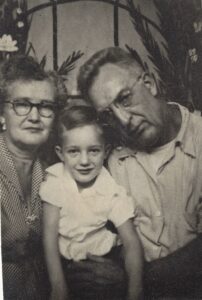
When he retired from his job as a carpenter for the Navy’s Cheatham Annex, he and Nanny moved to St. Cloud, Florida. On UVA’s spring break, I rolled down to Daytona Beach for the annual college student wild times. Midweek, I took a break from the craziness and drove over to St. Cloud.
That night after supper Papaw sat in a rocking chair on the porch, smoking his pipe, and we talked easily for a while. Then he fell silent. I felt something heavy coming, so I kept quiet.
He cleared his throat. “Your momma told me how good you’re doing in school,” he said. “She says it’s because you’re smart, but I suspect it’s got more to do with hard work.” He paused. Crickets sang in the bermuda grass. A car coasted down the street. He looked over at me. “You try real hard now, but that hasn’t always been your nature.”
I looked away, uncomfortable about the times I’d disappointed him.
“I want you to promise me you won’t slide back,” he said. “Promise me you’ll always try hard.”
I kept my head down, not sure I would keep such a promise. He waited me out. “I’ll try,” I finally said in a small voice.
He stared at me for a few moments, then resumed smoking and rocking. “I’m proud of you, boy,” he said gently.
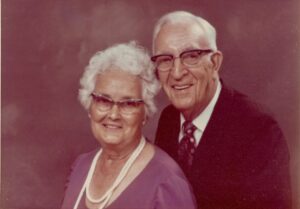
I didn’t know it then, but sometime before we had that talk the doctors found cancer in his knee. They wanted to amputate his leg. He wouldn’t agree to it. Over the next two years the cancer metastasized.
He had only a few months left when my brother and I drove down to St. Cloud. Papaw didn’t know we were coming. He was sitting in the living room talking to my uncle when we walked in. He grabbed my arm, pulled me down to him, and pressed his cheek against mine. “I thought I’d never see you again,” he choked out. It was the only time I ever saw him cry.
He took his last breath in bed at home with Mom by his side. Nanny had lost her will to live and had been hospitalized shortly before his death. She died a month later.
Researching my mother’s family tree decades after they passed away, I came across documentation of a marriage in Keokee in 1917 between a man with Papaw’s name and Una Mae Collier. Nanny’s name was Martha Alice Huff, so I thought there had to be some mistake, but the records called out Papaw’s correct birth date and occupation as a coal miner. I dug deeper and found a birth registry that said this couple had a son, Ralph, in 1918. The details about the father fit Papaw.
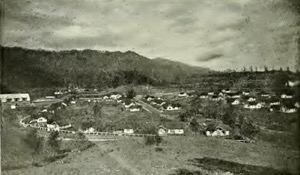
These records surprised me, but it was the death certificates that took my breath away. The infant son died early in 1918. Una Mae perished in October of that year during the second wave of the influenza pandemic. She was 18 years old. Papaw lost a sister two weeks later. The following year his mother fell prey to the third wave of the virus.
Papaw’s father survived the pandemic and struggled on for a decade, but he couldn’t live with the grief. The coroner’s report listed his cause of death as a self-inflicted gunshot wound to the head.
Another death certificate revealed one last heart-breaking blow. After Papaw found Nanny and somehow summoned the strength to rebuild his life, their third child, Jack, died of spinal meningitis.
None of this made sense to me. I couldn’t reconcile these devastating tragedies with Papaw’s steady optimism. The man I had known and loved was content, serene, happy.
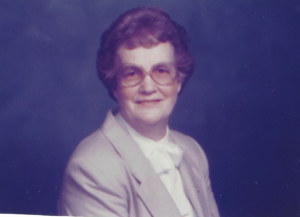
Mom was in her eighties when I asked her about the records I had found. “Is any of this true?”
“It’s all true. Daddy never spoke of it, but people in Keokee told me about those days. They said Una Mae was his childhood sweetheart. She and Daddy had only been married a little over a year when she and the baby died.” She shook her head sadly. “Daddy was real close to his momma, too.”
I asked about Papaw’s father. “I was a little girl when he killed himself. I remember Daddy crying about it and saying over and over again, ‘He finally went and did it.’”
“How did Papaw live with so much loss?”
“I don’t know, but he kept going somehow.” She gazed past me into the distance. “Daddy was real strong.”
I waited a respectful time and then said, “Tell me about Jack.”
Mom said her brother came down with a raging fever. The doctor told them there was little hope of survival and quarantined the family in the house. Papaw never left Jack’s bedside, wiping him down with ice and squeezing cold water from a cloth into his mouth, but the fever wouldn’t break. He died at dawn, a few days after his eleventh birthday.
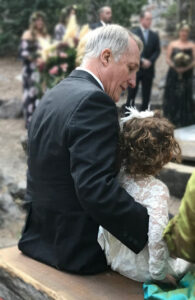 “You remind me of Jack sometimes,” Mom said in an off-handed way. “You resemble him some, and he was good in school, like you.”
“You remind me of Jack sometimes,” Mom said in an off-handed way. “You resemble him some, and he was good in school, like you.”
That casual comment sank in slowly.
When our first grandchild was born, her parents asked me what I wanted her to call me. We live in California, about as far away geographically and culturally from Appalachia as you can get. Sometimes people look at me funny when one of my grandkids calls me Papaw, but it always gives me a warm feeling inside.
During this pandemic, I’m sometimes fearful about the future and anxious for my family. I can only speak to my children and grandkids from a distance or technologically, and the CDC says hugging them might kill me. My closest social contacts are Drs. Fauci and Birx. The high point of the day is walking the dogs while decked out in hazmat mask and gloves. Ruthlessly sheltering in place, I’m simultaneously scared and bored.
That’s how I feel in my weak moments, but most of the time I’m okay. I have an advantage. When my spirit falters, I call to mind the promise I made, and I try hard to meet the standard set a century ago by the Papaw who came before me. Despite all his suffering, he was a good old guy with an easy smile, unfailingly kind and patient. I never saw him angry; I never heard him raise his voice; and I only saw him cry once. When he was alive, I took his good humor for granted. Today, I’m inspired by it.



May 8, 2020 @ 1:58 pm
Such a touching story. My sister’s father in law had a similar story. He married in Italy & immigrated to the USA. They had four children. His wife and all of his children perished in the flu epidemic. He remarried & had three more children (One being my wonderful brother in law). I think people were a sturdier stock back then. Thanks for sharing another of your wonderful life experiences.
May 9, 2020 @ 12:19 pm
Thanks, Charlotte! Losing a wife and four children is unfathomable. I still don’t know how so many who survived were able to keep going after such devastating losses. I agree about sturdier stock. When I catch myself moping about not being able to get a haircut or go out to dinner, it helps to remember what people like your sister’s father-in-law went through a century ago. Stay well.
May 5, 2020 @ 10:43 am
Ken, this story of your grandfather has touched me deeply! Thank you for writing it, especially at this time. You write so beautifully. I found myself actually seeing you, I was visually able to see you and your grandfather as I was reading it. I came to your email today because Francesca and I were invited to be on a podcast yesterday, our very first one together and I wanted to share it with you and Cindy. I hope you will be able to listen to it whenever you get a chance. I pray that you are all staying strong safe and healthy. I hope to see you all again soon. I pray that we will feel comfortable again soon to meet at Marmalade’s for breakfast. My love yo you, Cindy and the family❤️ Here is the podcast link: https://podcasts.apple.com/us/podcast/my-corner-of-the-universe/id1472911288?i=1000473515450
May 5, 2020 @ 2:10 pm
Thanks so much, Maria! We will watch the podcast. Hope to see you when this is over. Stay safe and well.
May 3, 2020 @ 12:17 pm
Heartwarming reminder of all the many tragedies people have and will overcome. I will mention your novella to our book club. They have a soft place in their heart for you.
Stay well.
May 3, 2020 @ 2:07 pm
Thanks, Ursula! I appreciate your encouragement and I have a soft place in my heart for your book club, too. I hope they’re allowed to meet sometime soon. 🙂
May 3, 2020 @ 10:55 am
Thanks for sharing this treasure from your life. Don’t be fearful for you continue to “try hard” and make your grandfather proud. Your writing inspire, causes people to stop and think as well as bring peace and joy. Thank you!
May 3, 2020 @ 12:10 pm
Thanks, Sherill. I appreciate your advice and your kind words so much.
May 3, 2020 @ 6:40 am
You never cease to inspire, Ken.….
May 3, 2020 @ 8:31 am
Thanks, Don! Hope this pandemic is over by next April. Or was it May? 🙂
May 2, 2020 @ 1:21 pm
Beautiful, thank you. Love how you write Ken. A pleasure to read.
May 2, 2020 @ 2:31 pm
Thanks, Colleen!
May 2, 2020 @ 9:45 am
This is a fascinating read, especially with the Corona Virus raging. I can’t imagine your Papaw losing his son, wife, sister, and mother so close together. I never knew the “waves” of the plague were so devastating. You come from strong stock!
May 2, 2020 @ 11:46 am
Thanks, Glenna! In researching for this I learned there were three waves, spring 1918, fall 1918, and a long dribbling one from 1919 to 20. There were flare ups periodically later, too, one as late as 1928. The second wave in 1918 was the most deadly and that’s the one that killed Papaw’s son, wife, and sister. The third wave got his mom in 1920. Unlike the corona virus, the 1918 influenza preyed on the young and strong. It killed tens of millions. Heartbreaking. Made me think we don’t have it so bad this time around.
May 2, 2020 @ 7:54 am
Ken, beautifully written, as always. Love your stories
May 2, 2020 @ 9:23 am
Thanks, Sharon! Your blog is the gold standard to which I aspire. Hope you and Mr. Twitchy came through your quarantine well. Stay safe!
May 2, 2020 @ 7:23 am
Wow! Ken, this post left me in tears. What wonderful memories you have of such a loving papaw. I would love to share it but would not do so without permission.
May 2, 2020 @ 9:21 am
Thanks, Betty! Please share this with anyone you like. I’m a struggling young (not) writer. Need all the readers I can reach. Great to hear from you again.
May 1, 2020 @ 7:48 pm
YOU’RE DOING IT, KEN.
BE WELL.
May 1, 2020 @ 9:48 pm
Thanks, Jeff. You stay safe and well, too.
May 1, 2020 @ 4:55 pm
Thanks for sharing your story with me Kenny.It was sad but true and it will instill in all who read a will to keep on going.We are stronger than we think and have our elders to thank for that.
May 1, 2020 @ 9:47 pm
Thanks, Larry. So true. And good to hear from you again.
May 1, 2020 @ 3:33 pm
A wonderful memory of what sounds like a determined man who loved his family deeply & you honouring him by using Pawpaw. Reminds me a lot of my grandmother (all other grandparents died before I was born) and brought back some great memories. Thank you for sharing a lovely and loving story
May 1, 2020 @ 9:46 pm
Thanks, John! I’m glad it brought back fond memories.
May 1, 2020 @ 1:36 pm
This really touched me. It made me cry.
May 1, 2020 @ 2:13 pm
Thanks for reading it, Alice. I’m glad it touched you. Made me cry, too, when I wrote it.
May 1, 2020 @ 1:29 pm
An optimistic spirit can carry all of the weight of your soul, especially with a strong faith in God. My grandmother was on a farm in Kansas during that influenza and it didn’t hit home at all. My grandfather was in Louisiana with the army. Some of his compadres got it, some got malaria, he didn’t get anything.
May 1, 2020 @ 2:11 pm
I agree with you about the optimistic spirit. Influenza hit the WWI soldiers overseas very hard, I read, and they brought it back home. Glad your grandparents made it through so well.
May 1, 2020 @ 1:22 pm
Great story. It can be very interstellar when you peruse through old family records. During this pandemic I’m glad I am mostly retired and my wife is retired. We are in reasonably good health at this point. The pandemic hasn’t yet arrived full force in SW Virginia. I hope it goes away before it does.
May 1, 2020 @ 2:08 pm
Thanks, Randy! The LA area is a hot spot, but the area where we live hasn’t seen much infection. I don’t know anyone here who has gotten it. Stay safe and well.
May 1, 2020 @ 1:20 pm
Oh Ken.…. I always love reading your words.…
I’m sure he is still smiling down on you from above. ♥️
May 1, 2020 @ 2:06 pm
Thanks, Cathy! I hope you’re right about that.
May 1, 2020 @ 1:05 pm
Poignant story as always, Ken. Walks down memory lane can be very centering in troubled times. Keep up the good work and stay safe.
May 1, 2020 @ 1:21 pm
Thanks, John! It’s hard to feel sorry for yourself when you know what people endured in the 1918 pandemic. You stay safe, too!
May 1, 2020 @ 12:49 pm
So beautiful and so sad. Your Pawpaw came from a generation that never gave up when times were hard. What an amazing man he was to live through so much heartache, yet remain the kind, gentle, loving soul he was. I think we can all learn, as you did, how things are sent to try us but you have to keep going. I had a special relationship with my grandad, (my dad’s dad) he died when I was 20, I’m 55 now and still miss him greatly. Your memories of your Pawpaw really moved me, we were both lucky to have such wonderful people in our lives. Stay safe through these frightening times and we will all be back with our families soon.
May 1, 2020 @ 1:19 pm
Thanks, Deborah, for sharing your memories of your granddad. We were indeed lucky to have such warm strong grandfathers. Thanks for following my blog, too!
May 1, 2020 @ 12:36 pm
Once again you made me cry! This one really got to me. My Swedish grandpa had the 1918 flu but survived it. He worked in the mines in Illinois and was a blacksmith. Tough and gentle guy. Like your Pawpaw. Stay safe and well! xox
May 1, 2020 @ 1:17 pm
Sounds like our grandfathers had a lot in common. Tough and gentle and good to us both. You stay safe and well, too!
May 1, 2020 @ 12:03 pm
Hey, you made me cry.
May 1, 2020 @ 1:15 pm
It hit a soft spot for me when I wrote it. Made me cry, too.
May 1, 2020 @ 11:45 am
Well, I’m crying now. I’ll have to get a grip on my emotions before I comment more.
May 1, 2020 @ 1:14 pm
Made me cry to write it, too. In a good way, though.
May 1, 2020 @ 11:27 am
Ken. Your Papaw would be very proud of the husband, dad, Papaw, friend and brother in law that you are. Thanks for sharing such a beautiful and moving story.
May 1, 2020 @ 1:13 pm
Thanks, Lucian, for those very kind words. I hope you’re able to get back on the road again soon. I miss reading about the walkabout.
May 1, 2020 @ 11:11 am
Loved accompanying you on this trip down memory lane. Here in Florida we have had a bit more freedom, so I bought a really nice bike (we cancelled several cruises!) and am gradually getting back to having some saddle comfort. Miss my daily trips to Back Alley Disk and Big Wheel Bikes just past the corner.
May 1, 2020 @ 1:11 pm
Thanks, Chad. Good to hear from you again. Biking sounds like good therapy for what we’re experiencing.